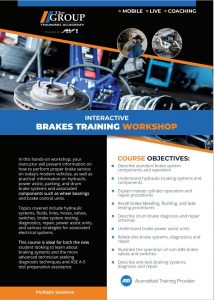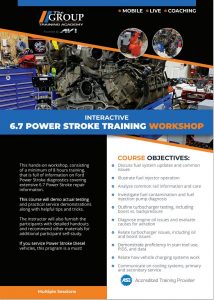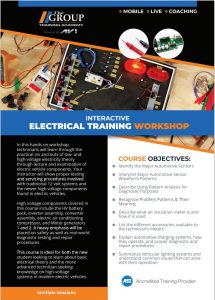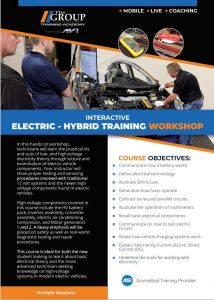New Training for 2024
INTERACTIVE MOBILE WORKSHOP
INTERACTIVE BRAKES TRAINING WORKSHOP
In this hands-on workshop, your instructor will present information on how to perform proper brake service on today's modern vehicles, as well as practical information on hydraulic, power assist, parking, and drum brake systems and associated components such as wheel bearings and brake control units.
Topics include: Hydraulic systems, fluids, lines, hoses, valves, switches, repair, power assist units, and various strategies for associated electrical systems.
This course is ideal for both the new student looking to learn about braking systems and the more advanced technician seeking diagnostic techniques and ASE A-5 test preparation assistance.
8 Study Hours
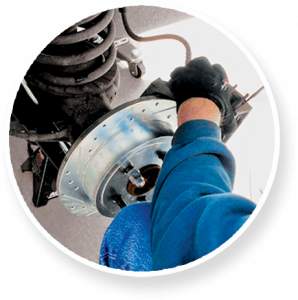
COURSE OBJECTIVES:
-
Describe Standard Brake System Components and Operation
-
Understand Hydraulic Braking Systems and Components
-
Explain Master Cylinder Operation and Repair Procedures
-
Recall Brake Bleeding, Flushing, and Leak Testing Procedures
-
Describe Drum Brake Diagnosis and Repair Schemas
-
Understand Brake Power Assist Units
-
Relate Disc Brake Systems, Diagnostics and Repair
-
Illustrate the Operation of Non-ABS Brake Valves and Switches
-
Describe Anti-Lock Braking Systems, Diagnosis and Repair
INTERACTIVE 6.7 POWER STROKE TRAINING WORKSHOP
This hands-on workshop, consisting of a minimum of 8 hours training, that is full of information on Ford Power Stroke diagnostics covering extensive 6.7 Power Stroke repair information.
This course will demo actual testing and practical service demonstrations along with helpful tips and tricks.
Topics include: fuel testing, pressure testing, volume testing, scan tool diagnostics, diagnostic tips, turbochargers, data network diagnostics, no start diagnostics, SCR & DPF systems and much more. The instructor will also furnish the participants with detailed handouts and recommend other materials for additional participant self-study.
If you service Power Stroke Diesel vehicles, this program is a must!
8 Study Hours
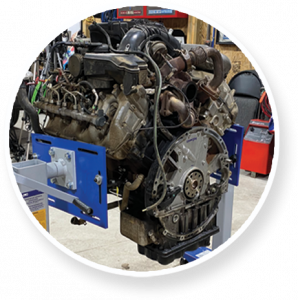
COURSE OBJECTIVES:
-
Discuss Fuel System Updates and Common Issues
-
Analyze Common Rail Information and Care
-
Investigate Fuel Contamination and Fuel Injection Pump Diagnosis
-
Outline Turbocharger Testing, Including Boost Vs. Backpressure
-
Diagnose Engine Oil Issues and Evaluate Causes for Aeration
-
Relate turbocharger issues, including oil and boost issues
-
Demonstrate proficiency in scan tool use, PIDS, and data
-
Relate how vehicle charging systems work
-
Communicate on cooling systems, primary and secondary service
-
Illustrate fuel injector operation
INTERACTIVE ELECTRICAL TRAINING WORKSHOP
In this hands-on workshop, technicians will learn through the practical ins and outs of low and high-voltage electricity theory through lecture and examination of electric vehicle components. Your instructor will show proper testing and servicing procedures involved with traditional 12 volt systems and the newer high voltage components found in electric vehicles.
High voltage components covered in this course include the HV battery pack, inverter assembly, converter assembly, electric air conditioning compressor, and Motor generators 1 and 2. A heavy emphasis will be placed on safety as well as real-world diagnostic testing and repair procedures.
This course is ideal for both the new student looking to learn about basic electrical theory and the more advanced technician seeking knowledge on high-voltage systems in modern electric vehicles.
8 Sudy Hours
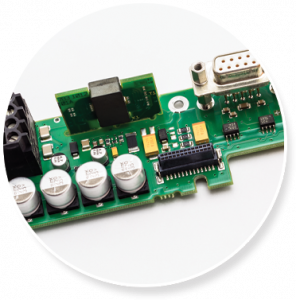
COURSE OBJECTIVES:
-
Communicate How a Battery Works
-
Define Electrical Terminology
-
Illustrate Ohms Law
-
Generalize How Fuses Operate
-
Contrast Series and Parallel Circuits
-
Illustrate the Operation of Multimeters
-
Recall Basic Electrical Components
-
Communicate on How to Test Electrical Circuits
-
Relate How Vehicle Charging Systems Work
-
Explain Alternating Current (AC) Vs. Direct Current (DC)
-
Underline the Tools for Working With Electricity (DC)
INTERACTIVE ELECTRIC - HYBRID TRAINING WORKSHOP
In this hands on workshop, students will learn diagnostic and repair techniques for working with high-voltage vehicles.
The course covers the components that make these vehicles unique and delves deep into their operation, their specialized components and effective diagnostic procedures. It also extensively covers the most critical subject of the lessons: safety. This class explains the vehicle’s workings, preparing the vehicle for safe diagnostic interaction, proper personal protective equipment for the technician, and recommended tools.
Topics include: Electricity fundamentals and testing procedures, wiring schematics, hybrid/EV configurations and components, safety, regenerative braking, EV cooling systems, scan tool diagnostics and much more.
8 Study Hours
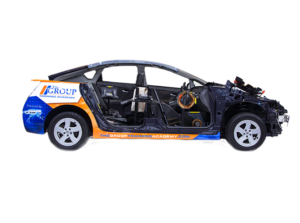
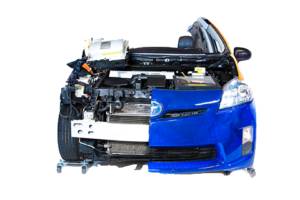
COURSE OBJECTIVES:
-
Understand the Fundamental Theories of Electricity and Electrical Current
-
Communicate on How to Test Electric Circuits
-
Generalize the Different Types of Electric and Hybrid Electric Vehicles
-
Understand Personal Protective Equipment and the Procedures to Follow
-
Describe Electric Vehicle Diagnostic Procedures
-
Communicate on High Voltage Battery Technology and Components
-
Describe High Voltage Component Testing, Removal, and Replacement
-
Illustrate Hybrid and Electric Vehicle Maintenance Procedures

INTERACTIVE ELECTRIC - HYBRID TRAINING WORKSHOP
In this hands on workshop, technicians will learn diagnostic and repair techniques for working with high-voltage vehicles.
The course covers the components that make these vehicles unique and delves deep into their operation, their specialized components and effective diagnostic procedures. It also extensively covers the most critical subject of the lessons: safety. This class explains the vehicle’s workings, preparing the vehicle for safe diagnostic interaction, proper personal protective equipment for the technician, and recommended tools.
Topics include: Electricity fundamentals and testing procedures, wiring schematics, hybrid/EV configurations and components, safety, regenerative braking, EV cooling systems, scan tool diagnostics and much more.
8 Study Hours


COURSE OBJECTIVES:
-
Understand the Fundamental Theories of Electricity and Electrical Current
-
Communicate on How to Test Electric Circuits
-
Generalize the Different Types of Electric and Hybrid Electric Vehicles
-
Understand Personal Protective Equipment and the Procedures to Follow
-
Describe Electric Vehicle Diagnostic Procedures
-
Communicate on High Voltage Battery Technology and Components
-
Describe High Voltage Component Testing, Removal, and Replacement
-
Illustrate Hybrid and Electric Vehicle Maintenance Procedures

Testimonials
I thought it was very well done. John Forro, the instructor was very, very informative, very learned on the technology. This is very cutting edge. He cut this car up to allow everybody to view the process, the inner workings. He showed us all the safety concerns. Very, very thorough on testing procedures. We were very, very pleased. We've got 20 people here, and every one of them is just thrilled that you guys could do this. And we really appreciate it. Very good job. Greg Kaufeld

